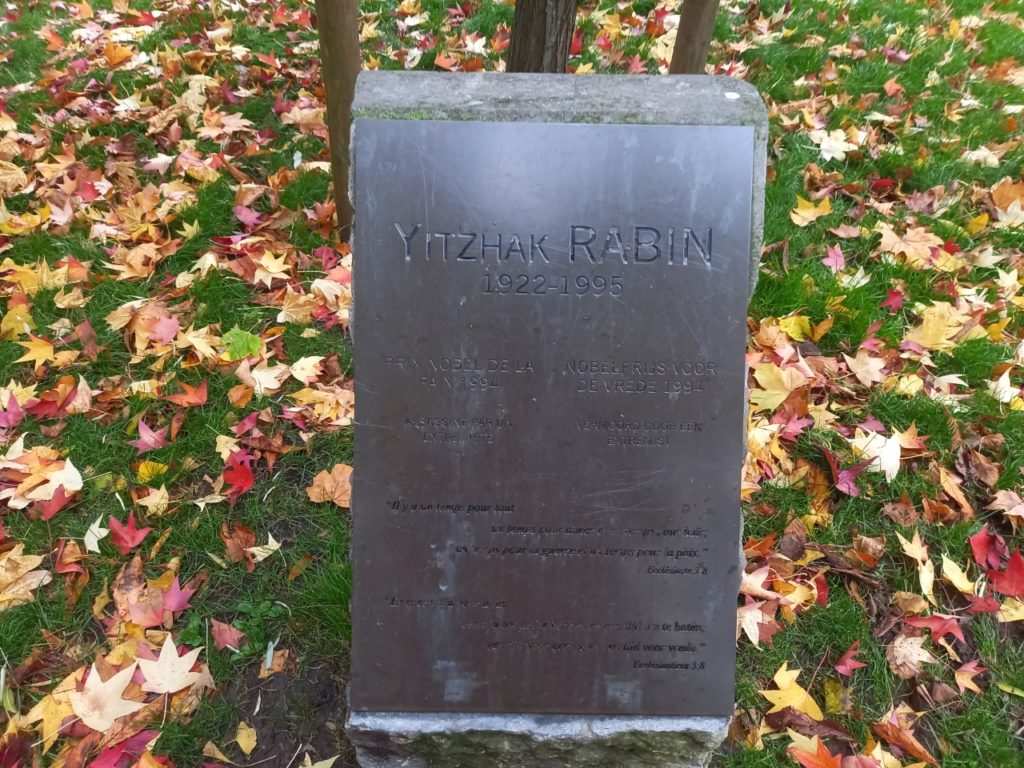Israel’s Prime Minister Yitzchak Rabin was assassinated by a Jewish extremist at a peace rally with 300,000 people in Tel Aviv on 4 November 1995. Today, 25 years later, his political legacy is largely forgotten.
Yitzchak Rabin (1922 – 1995), a general and former chief of staff, was awarded the Nobel Peace Prize in 1994 together with Palestinian leader Yasser Arafat and political adversary Shimon Peres who later became president of Israel. They shared the prize for their efforts to create peace in the Middle East.
It was no coincidence that they were awarded the peace price in Oslo by the Norwegian Prize Committee. The peace process that they had committed themselves to was named the “Oslo process” after the secret talks that took place in Norway between Israelis and Palestinians.
“By concluding the Oslo Accords, and subsequently following them up, Arafat, Peres and Rabin have made substantial contributions to a historic process through which peace and cooperation can replace war and hate,” the Committee motivated the decision.
The Committee hoped that the award would “serve as an encouragement to all the Israelis and Palestinians who are endeavouring to establish lasting peace in the region.”
After Rabin and Arafat had exchanged letters of mutual recognition in September 1993, Israel and the Palestinian Liberation Organisation (PLO) signed a number of agreements paving the way for the Palestinian Authority, a state in the making, and the transition to a fair, comprehensive and sustainable peace solution. That process continued also after the murder but without much wind in the sails.
Opinions are divided on the Oslo process and why it failed. Admittedly, there was an inherent logic in the process since it was based on interim solutions and confidence building measures, put together gradually like a complicated puzzle. However, the process was also flawed because the negotiations on the final status issues, such as refugees, Jerusalem, borders, and settlements, were postponed from time to time.
The process was not irreversible. New governments followed that were less dedicated to the peace process, backslided on the commitments and carried out provocative actions. The peace process was likely to derail along the way because of Palestinian terror attacks and Israel’s continued settlement construction which changed the demography in the occupied territories.
But that what not known in 1995 and the 25th anniversary of the assassination of Rabin is a reminder of what could have happened if he would have lived and continued to steer the peace process. Both sides needed desperately, as they still need, peace. Whatever final security arrangements Rabin had in mind, he – the former general - had become a passionate advocate for peace.
"Time for war, time for peace"
His speech in Oslo must be one of the most inspiring and emotional speeches that any Nobel Peace Prize Laureate has ever given. He had dreamt of becoming a water engineer but destiny made him a soldier for his country. “There is a time for war and a time for peace,” he quoted the Bible. Now was the time for peace. He had seen enough of cemeteries.
“Military cemeteries in every corner of the world are silent testimony to the failure of national leaders to sanctify human life. There is only one radical means of sanctifying human lives. Not armoured plating, or tanks, or planes, or concrete fortifications. The one radical solution is peace. We are in the midst of building the peace.”
Talking to journalists just before he was assassinated, Rabin said that, “Israelis want peace, support peace. The silent majority in Israel wants peace. It opposes the violence which threatens peace. No to violence, yes to peace.” Journalists who interviewed him at the peace rally said that he seemed happy and confident.
The murder in 1995 caused a national trauma and resulted in Israeli soul-searching. Contrary to what observers thought then, it did not result in any lasting backlash against the religious settler extremism and incitement which had nourished the murderer. If people thought that the two sides, inspired by Rabin’s legacy, would continue the peace process in good faith until they would reach a mutually agreeable solution, they were wrong.
The current coronavirus crisis in Israel has laid bare the internal division in the country, and the political, economic and constitutional crisis threatens its democracy. “I find myself wondering today about the soul of this country that Yitzhak loved so much. This year, more than ever, we gather here today and I fear that the flames within us are a danger to our home,” Israeli President Reuven Rivlin said at memorial ceremony last week.
“The country is divided like the Red Sea between two camps and hatred bubbles up beneath our feet. It cannot be that signs calling for the death of citizens are on display. It cannot be that journalists live under threat. It cannot be that citizens beat other citizens. It cannot be that police face severe verbal assault.”
“And it cannot be that someone will consider that the assassination of a prime minister, minister, president, Knesset member, is even a possibility. It cannot be that we permit or allow the next political murder even the slightest possibility by what we say or what we fail to say, by looking or by failing to look, by actions or by inaction.”
M. Apelblat
The Brussels Times

